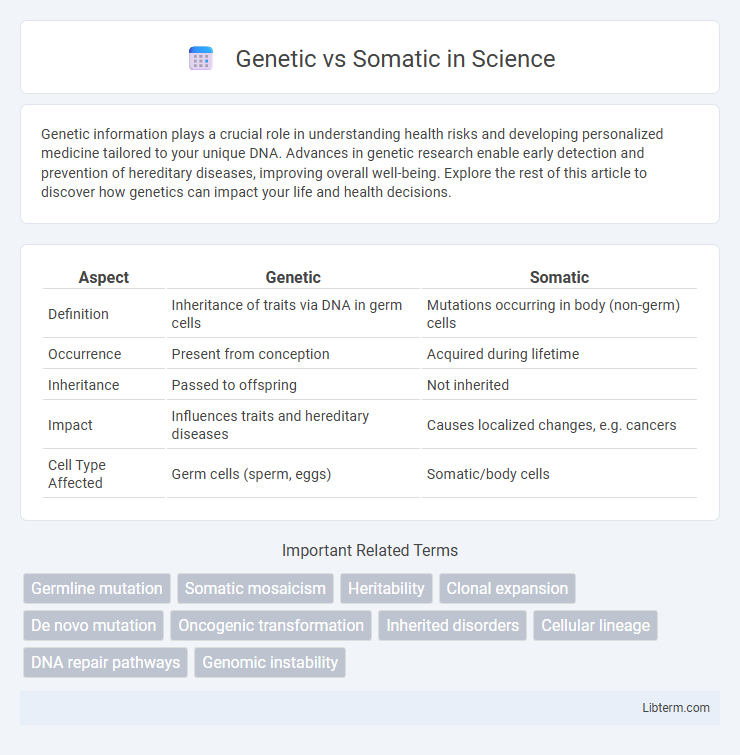Genetic information plays a crucial role in understanding health risks and developing personalized medicine tailored to your unique DNA. Advances in genetic research enable early detection and prevention of hereditary diseases, improving overall well-being. Explore the rest of this article to discover how genetics can impact your life and health decisions.
Table of Comparison
| Aspect | Genetic | Somatic |
|---|---|---|
| Definition | Inheritance of traits via DNA in germ cells | Mutations occurring in body (non-germ) cells |
| Occurrence | Present from conception | Acquired during lifetime |
| Inheritance | Passed to offspring | Not inherited |
| Impact | Influences traits and hereditary diseases | Causes localized changes, e.g. cancers |
| Cell Type Affected | Germ cells (sperm, eggs) | Somatic/body cells |
Understanding Genetic and Somatic Differences
Genetic differences originate from inherited DNA sequences passed from parents to offspring, affecting every cell in the organism. Somatic differences arise from mutations occurring in non-reproductive cells during an individual's lifetime, impacting only specific tissues or organs. Understanding these distinctions is crucial for diagnosing congenital disorders versus acquired diseases like cancer.
Defining Genetic Mutations: Inherited Changes
Genetic mutations refer to inherited changes in the DNA sequence passed from parents to offspring, affecting every cell in the body and potentially causing hereditary disorders. These germline mutations are present at conception and influence an individual's genetic makeup, distinguishing them from somatic mutations that occur after birth in specific cells. Inherited genetic mutations play a crucial role in conditions such as cystic fibrosis, Huntington's disease, and BRCA-related breast cancer.
What Are Somatic Mutations?
Somatic mutations are genetic alterations acquired by cells after conception, occurring in any cell except germ cells, and are not inherited by offspring. These mutations can result from environmental factors like UV radiation or errors during DNA replication and contribute to diseases such as cancer. Unlike germline mutations, somatic mutations affect only the individual's tissues and cannot be passed to future generations.
Sources of Genetic Mutations: Heredity and Family History
Genetic mutations inherited from parents, known as germline mutations, significantly influence an individual's risk of developing hereditary diseases, with family history serving as a critical indicator for potential genetic disorders. These inherited mutations are present in every cell and can be passed to offspring, distinguishing them from somatic mutations that occur after conception and are limited to specific cells. Understanding genetic mutation sources through family history enables targeted genetic testing and personalized medicine for early detection and prevention of inherited conditions.
Causes of Somatic Mutations: Environmental and Lifestyle Factors
Somatic mutations arise primarily from environmental exposures such as ultraviolet radiation, tobacco smoke, and exposure to carcinogenic chemicals, which induce DNA damage in non-germline cells. Lifestyle factors including diet, alcohol consumption, and chronic inflammation further contribute to the accumulation of these genetic alterations by affecting cellular repair mechanisms. Unlike inherited genetic mutations present from birth, somatic mutations occur post-conception and are confined to specific tissues, increasing the risk of cancers and other diseases linked to environmental insults.
Impact on Disease: Genetic vs Somatic Mutations
Genetic mutations, inherited from parents, affect every cell and can predispose individuals to hereditary diseases such as cystic fibrosis and hereditary breast cancer. Somatic mutations occur in non-germline cells during a person's lifetime and are primarily linked to cancers like melanoma and lung cancer, influencing tumor development and progression. Understanding the distinction between genetic and somatic mutations is crucial for accurate diagnosis, personalized treatment, and effective disease prevention strategies.
Role in Cancer: Somatic Alterations and Tumor Formation
Somatic alterations involve mutations acquired in non-germline cells, directly driving tumor formation by disrupting critical regulatory pathways such as DNA repair, cell cycle control, and apoptosis. These mutations accumulate in specific tissues, promoting clonal expansion of cancerous cells, unlike inherited genetic mutations that predispose individuals to cancer. Understanding somatic mutations through genomic sequencing enables targeted therapies tailored to the tumor's unique molecular profile, improving treatment efficacy.
Diagnostic Methods for Genetic and Somatic Mutations
Genetic mutations are typically identified through germline testing methods such as whole exome sequencing, Sanger sequencing, and microarray analysis, which detect hereditary changes present in all cells. Somatic mutations, occurring in specific tissues or tumors, require diagnostic approaches like targeted next-generation sequencing (NGS), digital PCR, and fluorescence in situ hybridization (FISH) to accurately characterize acquired alterations. These distinct diagnostic tools enable precise mutation profiling for personalized medicine and therapeutic decision-making.
Treatment Implications: Personalized Medicine Approaches
Genetic mutations inherited from parents require targeted therapies that address systemic risks and predispositions, while somatic mutations occurring in specific cells demand localized treatment strategies tailored to tumor heterogeneity. Personalized medicine leverages genomic profiling to distinguish between these mutation types, enabling precision oncology approaches that optimize drug selection and dosing. Integrating comprehensive mutation analysis into clinical decision-making enhances therapeutic efficacy and reduces adverse effects by aligning treatments with individual genetic and somatic tumor landscapes.
Future Research Directions in Genetic and Somatic Mutation Studies
Future research in genetic and somatic mutation studies will increasingly leverage advanced genomic sequencing techniques and single-cell analysis to elucidate mutation patterns and their roles in disease progression. Integration of multi-omics data and artificial intelligence-driven predictive models will enhance the understanding of mutation impact on personalized therapies and cancer evolution. Expanding longitudinal studies and developing precise genome-editing tools like CRISPR will facilitate targeted interventions and prevention strategies for mutation-related disorders.
Genetic Infographic

 libterm.com
libterm.com